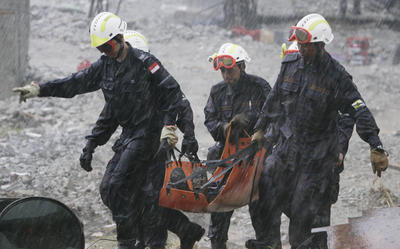Overview
Since the beginning of the new millennium, the international security environment has changed drastically. Although the risks of major armed conflict and interstate wars are now on the decline, the world is encountered with an increasing number of security challenges which are non-military in nature such as, climate change, resource scarcity, infectious diseases, natural disasters, irregular migration, food shortages, people smuggling, drug trafficking and transnational crime. In addition, these concepts can also be termed as non-traditional security (NTS).
What Is NTS?
To put it simply, imagine you have a castle and you have guards to keep it safe from people who shouldn’t be in there. Traditional security is like having a strong gate and intimidating guard dogs to keep intruders out.
However, NTS is a bit different. It’s like thinking about other factors that may put your castle in danger, despite the gate and the dog working fine. For example, what if a big storm happens and damages your castle? Or your friends and family catch an illness? What if you ran out of food and you have no cash to buy more?
So, NTS is like making sure your castle is safe from not just people trying to break in but also from other problems like environmental, health, or economic. It’s about thinking ahead and being ready for different kinds of issues that could affect your safety and happiness!
Characteristics of NTS
NTS focuses on non-military threats with these common characteristics:
- The threats are transnational in nature with regards to their origins, conceptions and effects.
- They do not stem from competition between states or shifts in the balance of power, but are often defined in political and socioeconomic terms.
- Non-traditional security issues such as resource scarcity and irregular migration cause societal and political instability and hence become threats to security.
- Other threats like climate change are often caused by human-induced disturbances to the fragile balance of nature with dire consequences to both states and societies which are often difficult to reverse or repair.
- National solutions are often inadequate and would thus essentially require regional and multilateral cooperation.
- The referent of security is no longer just the state (state sovereignty or territorial integrity), but also the people (survival, well-being, dignity) both at individual and societal levels.
Importance of NTS
However, why should the public be cognizant about NTS and what makes it so important?
Knowing about NTS is really crucial for a few reasons:
1) Looking at the Bigger Picture
Traditional security usually focuses on threats from other people or groups, like crimes or wars. But non-traditional security looks at other kinds of threats that could affect us, like natural disasters or health crises. By understanding these, we get a fuller picture of what could endanger us and how to protect ourselves from those risks.
2) Early Preparation for Future Disasters
Non-traditional security helps us prepare for things we might not think about every day. For example, knowing about climate change and its effects helps us plan for things like floods or droughts. Being prepared for these types of problems can save lives and reduce damage.
3) Creates an Interconnected World
In our world today, everything is connected. What happens in one part of the world can affect another. For example, a disease outbreak in one country can spread globally, or an economic problem in one place can impact people everywhere. Understanding non-traditional security helps us manage these global connections and find solutions.
Conclusion
Clearly, non-traditional security is essential because it expands our understanding that our safety and well-being can be threatened beyond conventional threats like crime or conflict. By addressing issues such as environmental challenges, health crises, and economic instability, non-traditional security helps us anticipate and prepare for a broader range of danger. Therefore, this holistic approach ensures that we are better equipped to handle complex challenges, ultimately leading to more resilient and thriving communities. Hence, understanding and addressing non-traditional security concerns is crucial for safeguarding our future and enhancing the quality of life for everyone.
References
About Non-Traditional security – NTS-Asia. (2024, June 28). https://rsis-ntsasia.org/about-nts-asia/
Non-Traditional security in Asia: Issues, challenges and Framework for action | ISEAS Publishing. (n.d.). https://bookshop.iseas.edu.sg/publication/2478#contents


